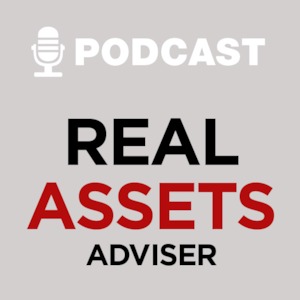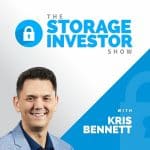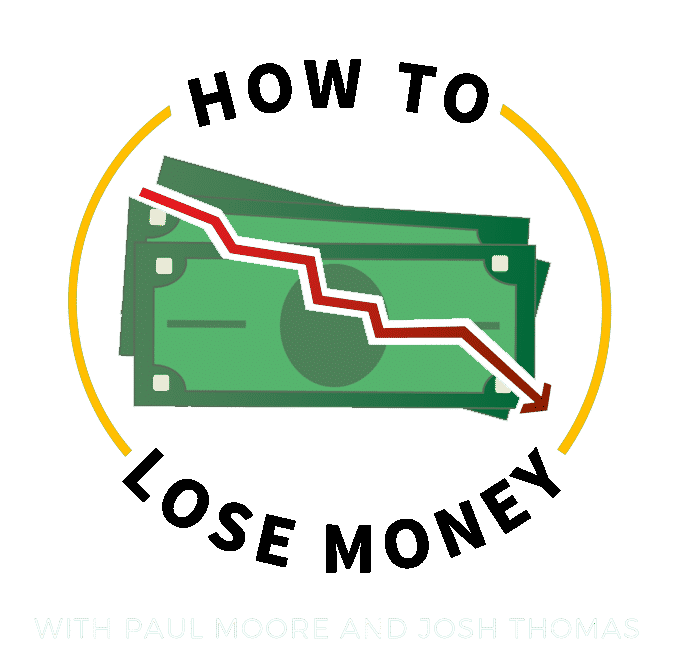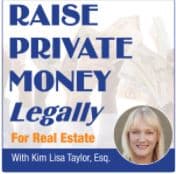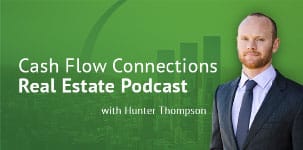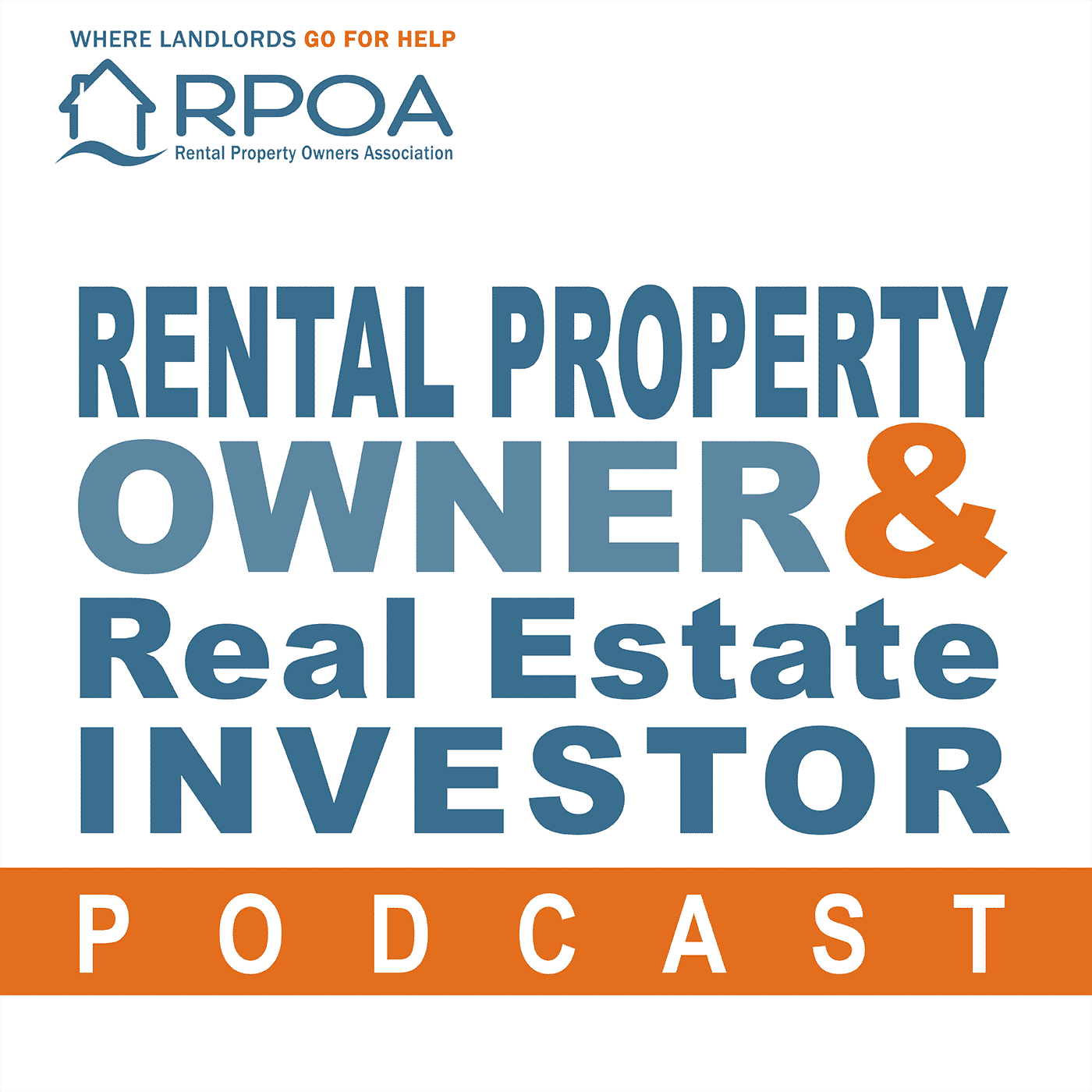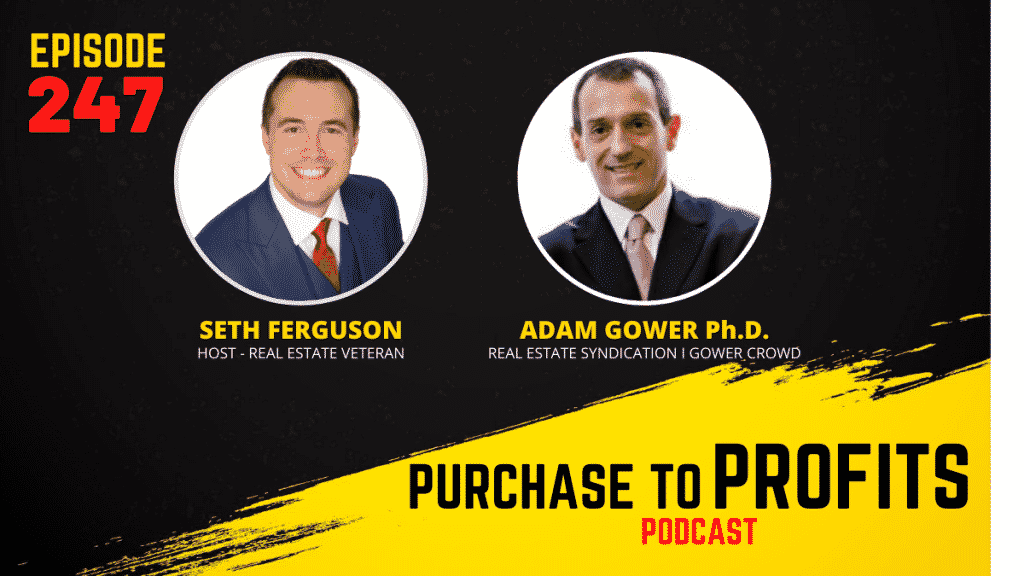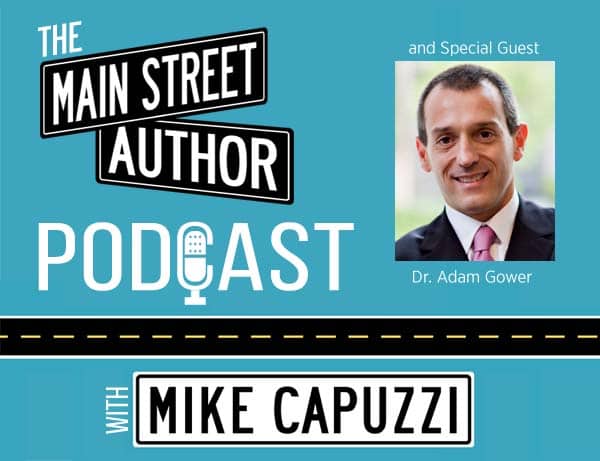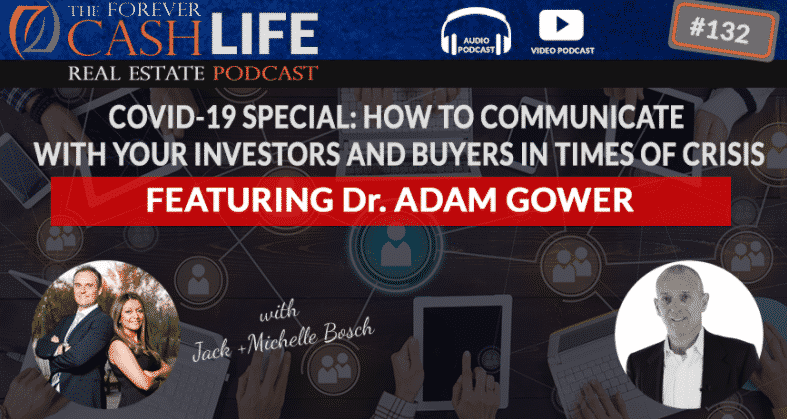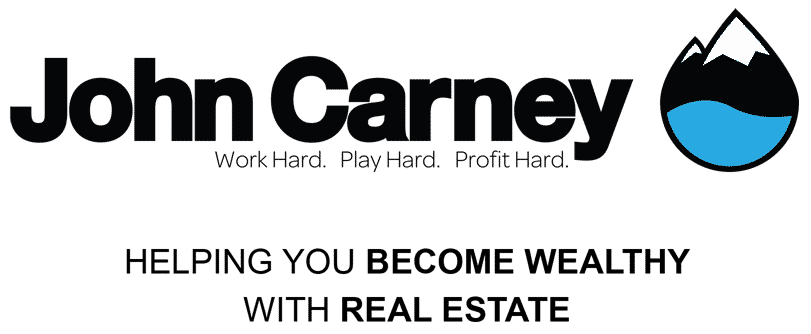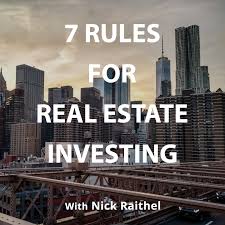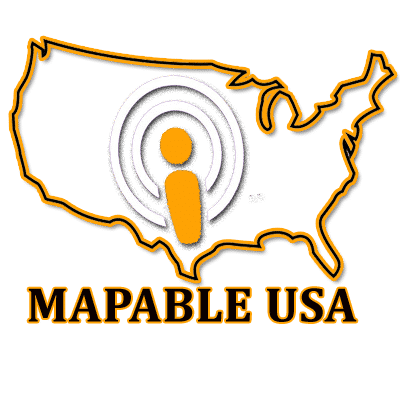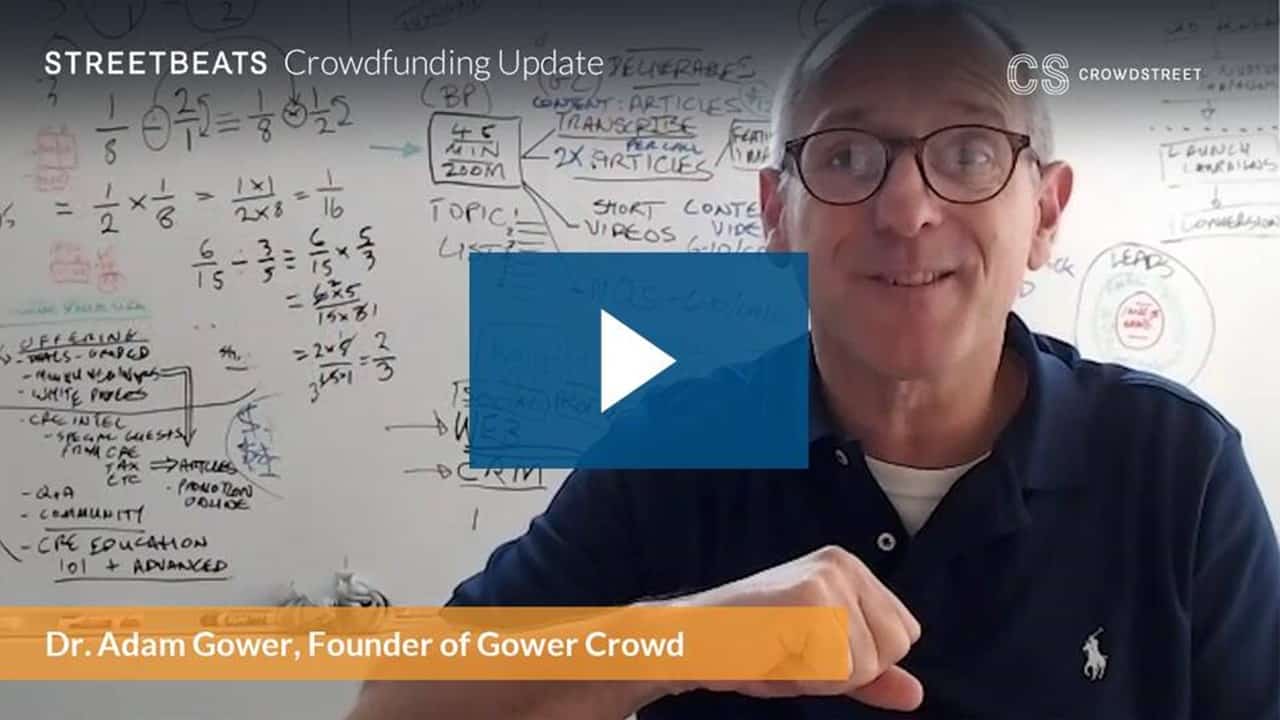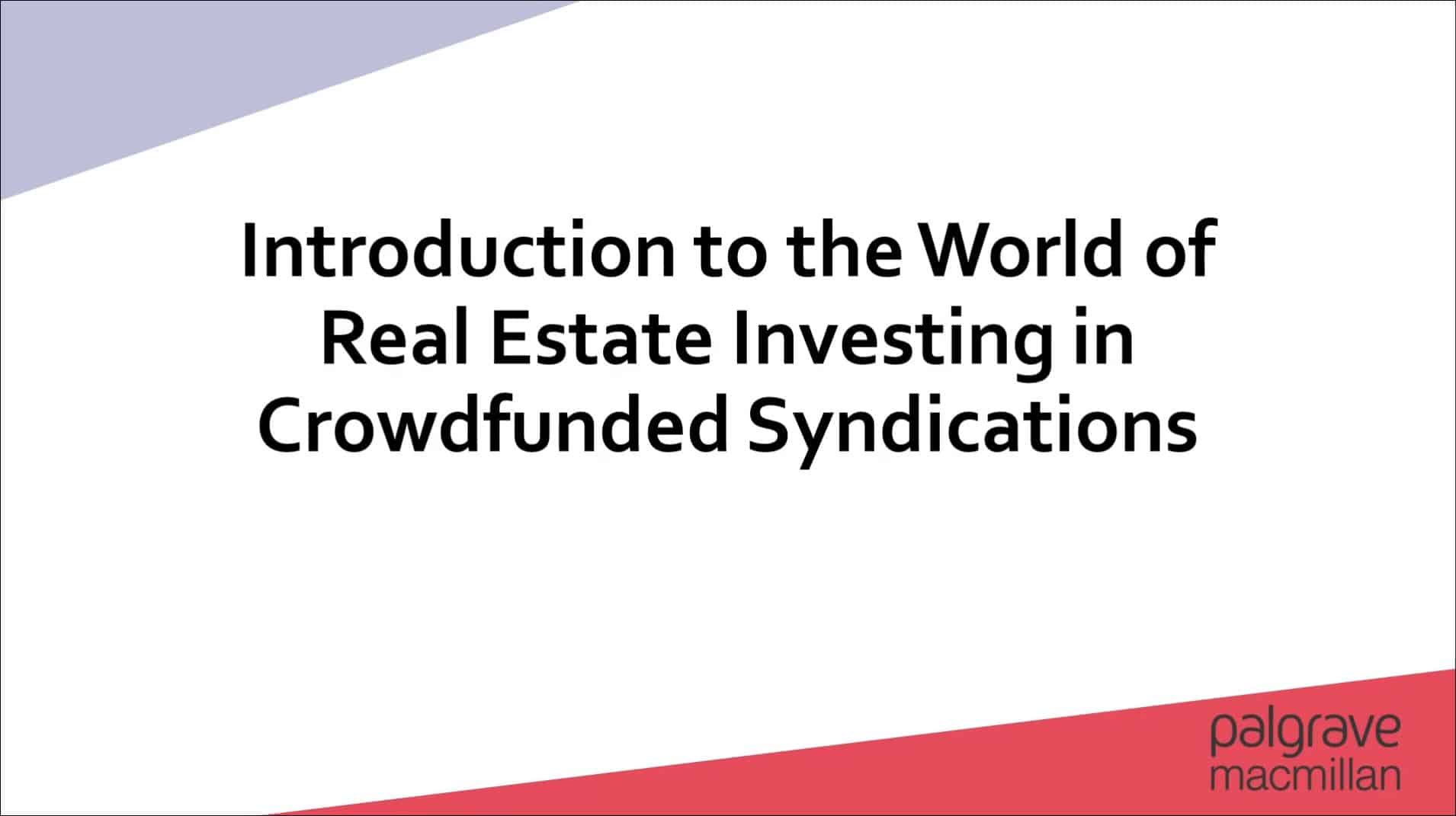GowerCrowd in the news
Press the play button above to watch the replay of this event.
Wealth Management Real Estate - March 2022
CRE Capital Raising and Investment Trends Forum
Press the play button below to watch the webinar replay.
The Brand-New World of Investing in Real Estate Online WMRE Webinar - March 2022
[00:00:00] Welcome everybody. Thank you for joining me today. At the risk of overselling this - this panel is, by far, the most important of all of them that you're going to see during this entire wealth management forum. And the reason for that, there are two reasons. One, opportunity. The world is pretty shaky right now and the economy is only going to get shakier. This is bad. However, that doesn't mean that money will disappear. It just means that it will be changing hands at a higher rate than it usually does which means that it might get harder to find new investors or clients. And yet this is good for two reasons. One, if you're a wealth manager and you help people and you're able to help people avoid what they fear the most, losing money, you'll be in more demand than ever, especially if you can show them how they can actually make money during a downturn. And if you're a real estate developer with good projects, well, you're already offering what people want: consistent income and wealth generation. I've been at this for over 30 years and I've been through at least two major economic downturns and each time business actually gets better because the people who are faking it vanish from sight and everyone else starts flocking to those who can solve their client's problems. Most of your competitors don't know as much about thriving during downtimes as you do. The very fact that you are here now learning about commercial real estate investing online proves this point.
[00:01:42] And it's easy to think that what we're going to be going through today is common knowledge, but it isn't. And I can tell you, with 100% certainty that you will see some of your competitors going out of business because they don't have the skills to thrive in a down economy. Or if you're a developer, because they're overleveraged, you know what that means. In both cases, this will leave more for you, assuming you know what to do. But it's not all silver lining. The second reason that I prepared this specific presentation for you is because this brand new world of online private equity real estate investing is filled with people giving really bad advice. The industry we're going to be talking about today has created a whole new breed of so-called experts. And awhile back, I actually started tracking them. I actually spent a fortune creating an entire section on my website that I was going to bill as the ultimate resource for private equity real estate education. What I discovered, was that there are literally hundreds of newbie experts who will show you every possible way of making a quick buck in real estate investing and what I realized is that they have no clue. And the reason that they have no clue is because they've only ever seen the good times. They've never experienced the downturn. So they have absolutely no idea how to capitalize on a downturn.
[00:03:19] Worse yet, they have no clue how to protect themselves when the market crashes. These folk, and the people they advise, are going to lose their shirts. More importantly, they're going to lose their real estate, which will present incredible opportunities for folk like you who are better prepared. Now I know this is true because I've personally been through downturns. Two downturns, two major downturns. Lost money, made money, and seen thousands of people fail. Of course, I don't want that to happen, of course. But I've also seen how the fittest survive and thrive and more importantly, what I'm going to show you today is exactly what you can do, right now, to get more clients into your business or if you're an investor - I'm sorry, if you're a developer, to get more investors. We are in for turbulence. You can come out on top or you can crash. We can't avoid the turbulence, but you can absolutely choose how to handle it. Welcome to the brand new world of investing in real estate online. I'm going to move my camera a little bit here. We're going to be looking at a quiet revolution that has been taking place in commercial real estate that allows you to invest in private equity real estate in a way previously prohibited and actually hidden from view and how you can take advantage today of the new benefits that this transformation brings. But we can't begin any kind of forum this week without asking the one big question that everyone is asking: Are we at a Wile E. Coyote moment in the economic cycle? You know who this guy is, don't you? Where everyone is just steaming ahead, either oblivious to or dismissive of the possibility that there is nothing propping up the economy.
[00:05:12] We are about to plummet into an economic abyss and even if you don't think that's the case, many of your clients may well be worried about that possibility. Inflation, supply chain issues, rising interest rates, record job quitting rates, yield curve inversion (we had one last week), war in Europe, sanctions, possibility of Russian sovereign debt, massive market uncertainty. In this presentation, I'm going to walk you through how and why private equity real estate has become accessible, viable, and not only an important option, but mandatory for any investment portfolio, if you want to satisfy the demands of your clients. And why now is the perfect time to banish any misconceptions that you may have about online real estate investing options. We're going to go through why real estate is essential to any well-balanced portfolio and whether or not you think we're going to fall off a cliff, how you can take advantage of the next major wealth transfer period when the market does fall, which it inevitably will sooner or later. Oh gosh, I took these slides out afterwards. Why real estate is an excellent hedge against inflation, a bulwark against volatility, whether it's for your own portfolio or that of your client.
[00:06:35] Quick break for a poll. You've got to do some work when you listen to me. Hop in. Please click one of these things. Has your firm considered building your investor or client base through online marketing? There are what? Five options there. If you would click them please. I'm going to take a quick swig. By the time I've finished swigging, we're going to move on because I've got a lot to cover today. And if there's time, I'll go ahead and show you the results of that, right at the end. Right? That's it. Here's what we're going to be covering. Part I. I'm going to go through the 6 traditional benefits of investing in real estate. In part II, I'm going to through six brand new benefits that you have never heard of before. And at the end of the presentation, I'm going to provide you with some exclusive resources you can gain access to today to help build, to strengthen your portfolio, build your reputation with your clients during a time of incredible uncertainty and unpredictability. As well as, at the end I'm going to review, the one thing that you absolutely must avoid when investing in private equity real estate online. You've got to stick around for that. It's absolutely critical. I'm going to give you a quick personal bio for that. Anybody that doesn't know - if you know me already, just pause for a moment. Here's what I've got. My background.
[00:08:05] I have a PhD in banking history and the mitigation of risk. My real estate background started in 1982 when I started pulling wires for an electrician. I raised over $500 million for real estate and transacted over a one and a half billion. I've worked for some of the largest real estate institutions in the world. I actually was hired into a bank during the last downturn to help clean out their balance sheets of nonperforming real estate collateralized loans. I published five books on real estate crowdfunding and CRE investment. I've been through multiple full-cycle real estate, full real estate cycles, and I've seen how people make and lose fortunes investing in real estate. For full details on who I am, what I do, go to GowerCrowd.com or run a google search. I love it. It's like a party trick. Put Adam Gower and crowdfunding into google, Adam Gower and syndication. Just my name, see how many pages you have to go through before you actually find an imposter who is not me, basically. And then try do it on yourself. It takes a lot to actually manage to do that. My primary business today is managing the GowerCrowd.com media company, where we provide news, education and unparalleled access to real estate deals from serious, online real estate deal flow. You will not find anybody who provides more information than we do. And we build digital marketing systems. Effectively, we build crowdfunding platforms for people who want to raise more money online, for issuers, developers who want to raise more money and for people who want more clients of any shape or size.
[00:09:39] Now, terminology. Let me just talk about terminology ever so briefly. This term crowdfunding is commonly used to describe online real estate because it succinctly encapsulates a recent change to real estate capital, a regulatory change to real estate capital formation. But really, the word crowdfunding just means online real estate syndication via advertising and digital marketing. It's a mouthful. It's just easier to say crowdfunding. Online real estate syndication, to importantly, accredited investors. That's what we're talking about today. Now, that's just a point of jargon. If I use the word crowdfunding, I'm really just talking about online syndication for real estate. Now, historically, real estate finance has gone through four evolutionary iterations. The first one was from the royals of history, who would hand out to elite barons, land who would collect rents from tenants, who either farmed the land or occupied buildings owned by the landlord. The second iteration was post civil war period where real estate syndications emerged. I actually - my PhD was largely part of this, as the country industrialized. The third iteration was post Great Depression, when it suddenly became strictly limited to an elite few. Again, as a result of the Securities Act of 1933 that required pre-existing relationships between sponsors and investors. And the fourth iteration, the one that we are in now, was when it was deregulated. by the 2012 JOBS Act, which, by the way, is almost to the day, exactly ten years ago, which allows for general solicitation by sponsors of investors.
[00:11:37] What does that mean? They can advertise and do online promotions. And I'm not talking about small-scale investing like a house or a duplex or a small office building where you tie up huge proportions of your net worth, sign on a loan and guarantee it. Right? Which is high risk, stressful, time consuming, distraction from core competencies, your family life, etc. And I'm not talking about REITs either, which are highly correlated to the stock market where you get these double whammies when the market goes down, you get clobbered by the market and any negative CRE sentiment. Where you pay a liquidity premium, right? You have to be paying a premium with a REIT to turn something that is intrinsically non liquid into a liquid asset and that are known for heavy fees. What we're talking about is the kind of investment opportunities that you can only ever get when you pool your money with a group of other people to buy big buildings managed by seasoned real estate professionals in real estate syndications. Now, visualize for a moment, the downtown area of the city that you're in, or your commute, to and from work, if you have to anymore. Picture the biggest, fanciest, most expensive looking buildings that you see there. Those buildings, you know, are run by professionals and that whoever owns those buildings must be very, very wealthy.
[00:13:07] You might know some of them. Chances are, however, that they are owned by a syndicate that consists of the principal together with passive investors. And that syndicate is made up of the principal's closest friends, relatives and business connections, because that's what the law insisted was the only way that you could put syndicates together. Now, because of the 2012 JOBS Act, we also have access to many of these syndicates. And what's fascinating, when you get into this, not just in buildings in your city, but nationwide across every single asset class: apartments, industrial, offices, senior housing, data centers, self storage, MOB, everything. The JOBS Act of 2012 gave birth to a brand new industry that sits at the intersection of commercial real estate and digital marketing that created three sectors within the industry. The first sector are the crowdfunding platforms: CrowdStreet. The big ones are CrowdStreet, RealtyMogul, RealCrowd and EquityMultiple. And if I can make a little plug, I'm actually hosting a webinar with the four founders of these platforms, April the fifth. Celebrate the ten year anniversary. I'll send you a link to, after this forum. Sign up. That is an amazing forum. It's going to be absolutely fascinating talking to the founders who really started the industry. The second sector are sponsors, right? a.k.a. general partners, operators, developers - technically, this is the issuer who is raising capital, otherwise known as the principal who are proactive or who are proactively raising capital on their own platforms.
[00:14:56] They're not going to a crowdfunding platform. They are creating their own platform. Like where we build for developers. We build crowdfunding platforms. Like, for example, Ben Reinberg, who I have to tell you is a client, right, full disclosure of Alliance Consolidated Group who you heard from on Monday. And the third sector is this ecosystem of service providers, wealth managers, tech experts, SAS providers, lawyers, accountants, etc. Brand new industries. Absolutely fascinating. But, what is happening in real estate with these changes and this brand new, the emergence of a brand new industry is actually not a new story. It has happened before in other industries. Like, for example, the 1990, because you're as old as me, you will remember this. The 1990's emergence of the internet and the advent of online discount brokerages like E-Trade and Charles Schwab, for example, that made it possible to invest in stocks directly. And around the same time, again, you will remember, that institutions didn't invest in real estate. Isn't that incredible? It's hard to remember that, actually. And it was the banking crisis of the 1980s and early 90's and subsequent deregulation that it started. And today, they are the single biggest investment in commercial real estate assets. In fact, I spoke to Geoffrey Dohrmann, Executive Chairman, CEO and Editor-in-Chief at Institutional Real Estate Inc, about this evolution of how institutional investors came into real estate. Absolutely fascinating. Again, we'll send you a link to this.
[00:16:43] You can listen to it later. It's fantastic. It's on the website, if you want to preempt my send you an email. By the way, it's easy - this is really important when you think about where we are today. It's easy to look back at the advent of the online brokerage or the domination of the commercial real estate industry by institutions and just take it for granted that technology combined with regulatory changes transforms industries like the travel agency industry is another example. No one was was conscious. Sorry. While those changes were happening, no one was conscious that the disruption was occurring. You didn't consciously think of it. And there were more skeptics than there were adherents. And, until one day, the old way of doing things was gone completely and everything had changed and that is exactly where we are today. We're in that flux period with online private equity, real estate syndications. There are plenty of skeptics, but an increasing number of adopters. And the quiet passing of an antiquated industry, what I call the "country club" way of financing real estate. And what you are witnessing today, following the deregs of the 2012 JOBS Act no exception. But, let's start at the top. How long am I into this? Start at the top, 20 minutes in. Prior to 30 years ago, only ultra wealthy individuals and families owned real estate. Then institutions like pension funds and endowments and insurance companies started investing in real estate.
[00:18:37] Now, you can too. But, why would you? So, before I jump into why, you may already be familiar with the benefits of investing in real estate. But stick around. I guarantee, unless you've already read all my books, or been to my website and dived in deep. There are some benefits, hidden benefits, that you've never considered. So, that one person in the audience who does not know the key benefits of investing in real estate, here they are. I'm going to go through this very, very quickly and I'm going to try not to inhale. I'm just going to try and do it quickly. But, I've got another poll for you. First, how familiar are you? I really scratched my head about what to talk about in this first phase. Help me out. It's a little bit hindsight. A little bit too late. But help me out, will you? How familiar are you, before I get into this, with the benefits or characteristics of online private equity real estate investing, a.k.a. crowdfunding, using a five point scale. I'm not going to linger here so if you want to give me an answer, do it now. A. Very familiar, B. Familiar, C. Somewhat familiar, D. Not very familiar, or E. Not at all familiar. If you're not sure what I'm talking about, good, as I'm going to cover it now. Right? I'll just give you another few seconds there and, next slide. Right. So, the benefits of investing in real estate.
[00:20:14] Try not to inhale. One. Stability relative to the volatility that you see in stocks and bonds. Unlike in the stock market, you simply don't see these massive swings in values, in a single day. There is a low correlation in real estate between publicly traded stocks and REITs, as you probably know, primarily due to the liquidity of stocks and bonds that can be traded at a moment's notice and that are subject to the daily news cycle. It doesn't happen with real estate. For example, have a quick look at the past three major economic crises. Black Monday. I actually remember this really clearly. I sent out - I hope I've got time. I sent out about 100 letters to people looking for a job. And I, like I had this typewriter - automated typewriter, a crazing thing. When I started calling people, they all said, Oh, we're in shock. I started calling them on October the 19th, 1987, and I thought, Oh, was my letter that good? I didn't know what was going on. Anyway, Black Monday, October 19, 1987. What a horrifying experience. This is what your clients are worried about today. This is what they are thinking about. Collapse in 2008 was the next one. This is the one that I'm thinking of, where the Dow Jones dropped over 50%. It's just horrifying, isn't it? Here's a nice job for that. That collapsed over there. And of course, this, what, 2008 was not a great year to be a real estate investor, right? Compared to stocks, though, it wasn't as bad and it didn't happen as quickly.
[00:21:49] And the third one, that I wanted to mention, one of the closest to our memory, of course, is the stock market's implosion in 2020, where the stocks fell as much as 35% from their highs. Real estate just didn't do it like this. Did experience some negative impact of the downturn. Some sectors more than others, of course. But it didn't fall off a cliff. It didn't do a Wile E. Coyote, like the stock market. Now that's not to say that real estate is immune from downturns, of course it isn't. You don't get the same volatility. In this map, unfortunately. I wish I could do something. Unfortunately, this graph is not the best because the colors aren't so great. But, you can see a line through the middle of this chart. It's showing how annual returns, on private equity real estate, this line through the middle, kind of bisecting the other line. Which is, comparing to publicly-traded REITs. It's actually date of the fund rise. And you can see it kind of looks like a moving average, like a rolling average that flattens out those bumps. And this is the same analysis compared to stocks. So you can see again, this line in the middle here. I've tried to point it out. Unfortunately, both lines are the same color. But the one that's bisecting the particularly volatile line here, the stock line, is private real estate, private equity, real estate, annual returns. You can see it's a lot flatter, less heavy, less frightening.
[00:23:19] So one of the benefits of investing in something stable, like this, is it's easier for wealth to accumulate and compound over time. Second major benefit, of course is passive income from rent. Even with the volatility that the last downturn caused, at the height of the pandemic, rental income, in most asset classes, in some asset classes (there were some that were completely decimated) had almost zero declines, specifically multifamily. Here's some data from RealCrowd. And you can see here that rent collections, basically, came back to parity by midyear 2020, in June 2020. And just came back to where they were. There was a small dip, but then they came back to where they were. Of course, different asset classes performed differently depending on the economy. But the principle here, is that there are opportunities within real estate for any point in the market cycle and that landlords always collect rent or continue to collect rent. The third thing is that you find consistently higher yields over time with real estate. Here's another Fundrise chart that shows income generation of private real estate versus REITs, bonds and stocks. On the left here, in orange, private real estate 6.1. By the way, this is over a 20 year period. I grabbed this data, I want to say, a couple of months ago. So, this is fairly consistent. The 20 year data, against REITs, bonds and stocks, private equity, real estate has consistently higher income generation in addition to equity appreciation over time. So we're in a, essentially we're in a whole different league when it comes to generating ongoing stable cash flow from income generating assets.
[00:25:07] By the way, if you don't believe this, you realize that there's more behind this than there is, which, of course, there is. Keep in mind, that your clients are thinking exactly this way. Right? They want to know more about it and they want to hear about it from you. So how does all this work? Right? In terms of rent. Well, if you don't own property, you rent. And if you rent, you sign a binding contract to pay rent that has powers of enforcement built into them. Of course, there are many levels of credit worthiness for tenants. That's a whole different discussion. But think about this. You invest in stocks, right? And you buy stocks issued by companies of all shapes, sizes and across all industries. Guess what? All of those companies either own or rent real estate to house their operations. And somebody owns that real estate. Right? And in many cases, it's big enough, that real estate is owned by syndicates. That now, you can invest it. So, you can invest in a stock of a company and join a syndicate that owns the building that your company has invested in, rents, that has a contractual obligation to pay the rent with higher yields that we've seen and frequently with higher value appreciation than the stocks you invest. Number Four. The power of leverage. I'm going to do some really basic math.
[00:26:45] I'm going to do this very fast. Debt, a.k.a. debt. All right. So here is some data from the St Louis Fed. This shows the percentage change from the year before of commercial real estate prices, right? So you see a big drop here, in the last global financial crisis. But, if looking at this line, here's 10% growth over here, year on year. On average, let's just say that real estate, based on these numbers, increases by 4% a year, which doesn't sound like much. But, here's the power of leverage. Just doing this very fast. Let's say you buy an office building for 10 million and a syndicate invests $2.5, and the bank provides $7.5 million of the debt. Building increases in value by 4% = $400,000. So as a percentage of that $2.5 million investment, that's a 16% appreciation, right? Plus, not only do you get the value appreciation, but you also get the excess income from rents along the way. Plus, this happens year after year after year. That's the basic principle of how leverage benefits real estate investment. Five, tax benefit. I have a saying - I have an expression A-A-A. Ask an accountant. I don't really understand tax and I don't talk about it. But I am a doctor. You're going to have to trust me on this. Trust me, I'm a doctor. Tax benefits. Here are the basic ones. Depreciation, deduction of operating expenses, mortgage interest is a deduction, 1031 exchanges, 721 exchanges, opportunity zone investments, etc..
[00:28:25] Suffice it to say: massive tax benefits. Right? Six. Great hedge against inflation. Check this out. There is an annual change in total value of US apartment stock again, versus inflation. And so here we've got a couple of periods, right? The savings and loan crisis. It's the 90's, dot com bust, 2000 global financial crisis, etc. And this green line across the middle is the average growth rate. Real estate red line is inflation. Right? Simple, just basic stats that demonstrate real estate, typically outpaces inflation. Now real estate is measured by net income. The more net income you get, the higher the yield on the original purchase price and the more the asset value grows. The biggest cost of holding holding real estate is the debt which can be held down with long term fixed rates. So investors, real estate investors benefit disproportionately from inflationary rent increases while the highest cost. A highest line item, debt, remains stable. So that's kind of the mechanism for how real estate beats inflation. So with all these benefits, why do so few people invest in commercial real estate? Well, prior to the 2012 JOBS Act, it was prohibited for syndicators to raise money from anyone they didn't already know and this led to the emergence of these elite cliques - this country-club cliché. You had to be a member of the right country club to raise money for real estate or to invest in real estate. It didn't matter. The principle was, it wasn't what you knew.
[00:30:13] I was actually brought up learning this. It's still true of course. But not what you knew in real estate investing, but who you knew. And this created a patchwork of exclusive clubs around the country with small groups of wealthy individuals transacting behind closed doors. Now, this is really key. Who didn't know what anyone else in the country was doing. They could only know what the sponsor, they were investing with, told them. What kind of returns to expect, what kind of profit splits, the risks, etc. with no cross pollinization of ideas or best practice. No industry standards, no known industry standards, no transparency, imperfect information. There was nothing nefarious about it. It was the unintended consequence of restrictive legislation, 1933. And online syndication, a.k.a. crowdfunding, has completely changed that, revealing - Part 2 - 6 brand new benefits that no-one had access to before, and I mean no-one. But first, let's have a quick look to see how big online syndication, a.k.a. crowdfunding has become. We do all kinds of analysis here at GowerCrowd. This is a quick chart. I'm going to run through quickly, of some SEC data that we that we scraped that shows the difference being Reg 506(b), which is Reg D 506 (b), which is, just keeping it simple. Basically, non-crowdfunded, the old way of raising money for real estate and 506(c), which is the new way. Now it doesn't stand for crowdfunding, but keep that in your mind, to remember the difference.
[00:32:06] The black line shows the number of deals historically since crowdfunding was legalized in 2012. 2013, when the laws were promulgated. The gray line in the middle is non crowdfunded and the line at the bottom is the crowdfunded deal. So you can see here, 2013 promulgation of the laws, a year after the act passed and very low numbers across the board in real estate. New deals in real estate were very low because the aftermath of the global financial crisis. What you see here, with crowdfunded deals is the steady growth of online syndication reaching, in just a few years, 23% of all deals, listed with the SCC or registered with the SCC, 2021. It's incredible. 2020 - check this out. 506(b) non-crowdfunded deal, registrations dropped almost 14%. Crowdfunded deals only dropped 3%. What does that tell you? Individual investors seek real estate as an alternative during times of volatility, especially when the stock market drops. It is your responsibility to come up to speed on this stuff because your clients want to know. This is what's in their mind. They're looking to you for guidance and ideas and advice. It demonstrates how high net individuals, demand from high net individuals - and we're going to discuss a little bit more about how you can leverage this, how you can benefit from this. Why it's important for you, shortly. Before you ask. Yes, same trend with dollar volume and not just the number of deals.
[00:33:47] You see the same trend with dollar volume. Dollar volume, 6 billion, 2021 crowdfunded deals, 23% of all transactions through general solicitation online. Another very important point. Deal sizes are trending ever larger, every single year. Orange line are all deals. Now, this is just crowdfunded deals. Everything above 50 million in size. That's equity raise, by the way. The next one is the gray line. Anything between ten and 50, which is sub institutional, but above your mom and pop and then kind of mom and pop range small, less than 10. All of these are trending higher, particularly the institutional. It is not uncommon these days. We've got more and more institutional clients coming through our door wanting us to build a platform for them so they can raise money. Not uncommon to see $40 million equity raises for single deals. That is institutional-caliber real estate. It's a fundamental shift in the industry. Which brings us to. At last. The best thing in real estate online, a.k.a. crowdfunding. One. The liberalization of information so you can make informed decisions. Number two. Intel about industry norms so you know you're getting a fair deal. Number three. Risk reduction through portfolio diversification. There's a nuance to it. How to leverage, number four. How to leverage institutional power and influence to maximize your returns. Number five. Anonymity and the complete avoidance of being pitched. Number six. Wealth transfers during downturns.
[00:35:33] My favorite. Wealth transfers during downturns to you and your clients. Liberalize. Lets's start with number one. Liberalization of information so you can make informed decisions. Used to be that you only had access to local opportunities and information. You had to know somebody in order to be able to invest. But now all that information, that was so closely held before, all online, O-M-G. Completely transparent. Last year, on a CrowdStreet live stream, they listed the 20 cities, the best cities to invest in real estate across the country, and they drilled down, in detail, on every single one of those top cities. Do not take this for granted. You might think it's obvious that this kind of information is available. It isn't. But it is now. But it wasn't and it's still a brand new way of accessing information that's never been available before. Number two. Brand new benefit. The intel about industry norms, so you know that you're getting a fair deal. Transparency, as a result of everything going online, now means that you can learn what market terms are or investing in a syndicate, for example, and a preferred return is standard (the yield), what kind of profits split, the most common, right, the promote (the carried interest). The way these returns are distributed, or in what are called, waterfalls, in commercial real estate. These were, basically, you only knew what, whoever you were investing with, you only knew what he told you.
[00:37:24] Well, we conducted a study that reveals, for the first time, market rates for preferred return (yield) and carried interest (the promote) and we wrote a white paper about this. I'm going to send you this later. White paper on the waterfall in real estate syndication. It reveals all of those market standards. That was based on, I don't know, hundreds, thousands and thousands, tens of thousands of deals, hundreds of thousands of individual investments. The third hidden benefit that has come about because of crowdfunding is risk reduction through portfolio diversification. And I'm not talking about diversification into real estate, but within real estate. Minimum investment or as low as $5,000. Actually, there's some really crazy places you can actually invest $5 but for accredited investment is basically a $5,000 minimum. More commonly around $25,000 minimum. So now, you can diversify a real estate portfolio that includes multifamily, medical office buildings, data centers, self storage, hospitality, industrial, any asset class that you want. This is brand new. It's never been possible before. You can invest - you can diversify by sponsor (the issuer), by geography, by investment strategy, core, core-plus, etc. and what kind of risk tolerance you have. At Gower Crowd, we actually list every single deal that comes out. OMG moment. Every week, we list every brand new deal that comes out. I'm going to send you a, actually, well, you'd find it on the website, over here. And what we include, over there, is the name of the issuing company, contact information, the name, phone number and address, website links, in some cases, whether or not it's a B or C offering, ie crowdfunding or not, how big the offering is, what the minimum investment is.
[00:39:32] It is the motherlode of every deal. Just think about that. You've just never been able to create a portfolio with such wide diversification in real estate before. Plus, we also provide direct access to every advertised deal that we can find. I've hidden my phone somewhere. I love this one. Don't you just hate it when you go on your phone and you go on to Facebook and you've got all those annoying personal posts, right? Getting in the way of the really good stuff. The ads. Oh, don't you love the ads? This is also - we, don't tell anyone, but we scrape Facebook, we consolidate on the website, on Gower Crowd. Every single real estate ad that there is - oh, this is fantastic. I love it. You want to find real estate deals, they're all there, on the Gower Crowd website. Here's what the page looks like. I can't stand down in using these slides. I'm just doing a quick sequence here. And I'm giving a 40 minute warning. Well, I'm just going to keep on going, so I can get through this quickly. It's like this consolidation of information is like knowing all the members of every country club in the country. It's like attending every conference and joining every board. Think about how you use the network to find real estate opportunities.
[00:40:53] This is all online. All there. It's completely free. You can access it from your phone. Unbelievable. Fourth hidden benefit. Brand new benefit. How to leverage institutional power and influence to maximize your return. So with the increasing deal sizes, the industry has become increasingly institutionalized. That means that institutional scale issuers have begun to realize the benefits of pursuing multiple capital sources of ideas and they're turning to individual investors, like your client, to raise capital online alongside institutional capital. For three reasons. One, it's always good to have an alternative capital source. Two. It provides greater flexibility. They're no longer running their business by committee. And in many ways, this is better for investors. And if you doubt that, ask me in the Q&A here and I'll follow up with you afterwards. And number three, during downturns. What happens to institutions? They run for cover. We'll come back to that in a minute. So the big advantage of the institutionalization of real estate online is that you can invest alongside institutional partners. As an individual investor, you may not want to take the time or you certainly don't have the money. If you're investing $25,000, you don't have the time or the money to research everything about the deal, but institutions do. I've seen this. They spend sometimes, tens of thousands of dollars, double checking a sponsor assumption in their legal docs. And in some cases, not all, you can invest in deals, with sponsors, who also have institutional investors in the deal.
[00:42:37] In other words, you can piggyback institutional caliber due diligence. Right? Phenomenal. The fifth brand new benefit. Anonymity. Hello. The avoidance of ever being pitched again, the need to be pitched again, a.k.a. bliss, right? You can research every deal, every sponsor, every opportunity, completely anonymously, online. You don't have to talk to them. Isn't that wonderful? Until you are ready, right? You don't have to sit through another pitch meeting and spend countless hours. Let me just run through this. You can do it all online. You can do it in your own time. Whatever device you choose. Wherever you like, whenever you like. So today, mandatory minimum requirement for entry, for participation in the commercial real estate business is a sponsor. Must have an informative website. They have to have an online social media presence, be completely transparent, tell you who their team is, for crying out loud, what they do and their investment philosophy. The same applies, if you're a wealth manager. You want the same kind of online presence as well. And they need to provide open access to full details of the deals they want you to invest in, and if they don't? Pass. There are plenty who do. Check out Alliance, for example, plugging a client. Right? You would do the same in my shoes. alliancecgc.com. We built that website. Take a look. It is everything that you ever need to know about medical office buildings. The most complete repository of information about that incredible industry. Never before available. Check it out.
[00:44:25] Finally. My favorite. Best for last. Back to where we started. Right at the beginning. Market uncertainty of a downturn eventually. Brand new benefit. Number six. Wealth, in times of recession and how you can be on the receiving end of that equation. Never want anything bad for anybody. But the inevitability of a downturn makes this my absolute favorite. I've seen two severe downturns. Saving the loan crisis, 1980s Global Financial Crisis 2008. These are periods of massive wealth transfer from the imprudent and inexperienced to the patient and careful. And for the first time, you can participate on the winning side of that equation. Here's how it works. David, don't worry, I'm nearly done. Okay. I've jsut got a few slides left. During downturns, liquidity dries up. Over levered and novice real estate investors find themselves in cash crunches and they start losing assets to the bank. Right? The first lien holder, or they sell ahead of foreclosure to salvage some of their equity. But they do that at a steep discount to what they originally paid. And during major, prior major downturns - it's really important to understand why this time is different. Seasoned, patient, long term sponsors have access to deal flow, but, it didn't have access to as much cash as they would have liked to have, given the distressed real estate opportunities that were in front of them. Institution pull back, if you remember, even last year, 2020.
[00:46:11] Right? But particularly global financial crisis and who the heck knows what's going to happen in the next few weeks and months. Banks stop lending, cash evaporates from circulation, prices plummet, making it an amazing buy opportunity. But, during prior downturns, sponsors with access to deal flow, needed access to more cash to take full advantage of these prices. And while their usual suspects, like these small cliques of investors who've also gone to ground, by and large, and institutional capital had dried up, there were still plenty of accredited investors with cash, like your clients today, who wanted to invest in discounted real estate but who had no access to it. Right? They have no access. And even if these accredited investors had access, they had neither enough cash nor the wherewithal to handle distressed real estate, and sponsors were prohibited by law from soliciting them to invest in their deal, if they didn't already have a preexisting relationship. This time - I wrote this a little while ago. The next time, this time, it's different. Savvy sponsors and investors are getting to know each other now. Investors are researching sponsors online, anonymously. Establishing relationships digitally, making investments, test investments, and getting to know, like and trust the best sponsors and when the next downturn comes, maybe this is it now, you can be positioned to partner with seasoned, successful, conservative sponsors with patience and long-term perspective to buy discounted real estate at the bottom of the market. This is what your clients want you to do, right? You can be the gateway today, to build wealth in a way never before possible.
Online Real Estate Syndication - 10 Year Anniversary
GowerCrowd Special Event
Press the play button below to watch the webinar replay.
Get access to our FREE weekly newsletter exclusively covering the latest updates from the real estate crowdfunding world
Contributing Author
Series of articles in nationally syndicated press...

Rainmakers In Debt & Equity
GowerCrowd honored to be selected as one of 2021's picks by GlobeSt. for their annual listing of debt and equity rainmakers. Learn more...

Fall, 2023: How to Navigate Risk and Maximize Returns When Investing in Distressed Real Estate

For better or worse, the age of the mass retail consumer and investor has burst into full blossom,

Real estate crowdfunding hits record highs during the pandemic

Real estate crowdfunding doubles, becoming growing force in industry
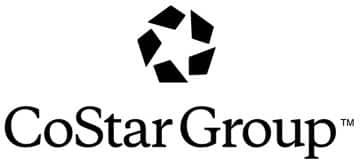
Pandemic Life Finds a Match in Real Estate Crowdfunding. Demand Rebounds As New Proposed Rules Set Sector for Growth

Hospitality Construction: A Long-Term Bet During Uncertain Times

Crowdfunding in commercial real estate has grown to account for a quarter of all syndicated CRE transactions.


Connected Dots And Inner Workings Of Real Estate Crowdfunding

Influencers in Marketing

How Crowdfunding has Disproportionately Benefitted the Real Estate Industry

Create a Meaningful Link - An overlooked marketing tool can help mortgage brokers close more deals

What a Difference 80 Days Can Make

Solving Homelessness In LA: Innovations In Affordable Housing Projects
Read More...

The fall of RealtyShares: Four lessons learned

Lessons from the Fall of RealtyShares
How Los Angeles Is Tackling Homelessness With Limited Real Estate
Podcast Appearances
Click the images to listen to the show.
Webinars & Other Media
Webinar - IMS
Getting Out of Excel – Leveraging Technology to Reduce Risk, Increase Accuracy, and Provide Transparency
Click play button above to watch now...
Video - Springer Link






